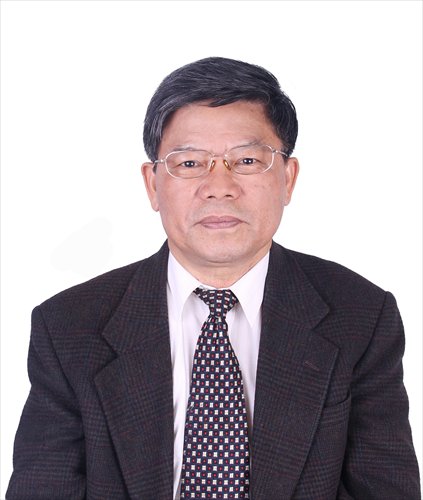Potential of Sino-Brazilian ties to be tapped

Chen Duqing(陈笃庆)
Editor's Note:
2014 marks the 40th anniversary of the establishment of diplomatic ties between China and Brazil. With growing political trust and economic and trading volume, Brazil has become an important partner of China in Latin America. Chinese President Xi Jinping's visit to Brazil in July marked a milestone in the development of the bilateral relations. Finding ways to achieve brighter prospects in the future development by drawing experience from the past is an important task. Global Times ( GT ) reporter Wang Xiaonan talked to Chen Duqing ( Chen ), former ambassador extraordinary and plenipotentiary of China to Brazil and currently director of the Center for Brazilian Studies, Chinese Academy of Social Sciences, on the potential in Sino-Brazilian cooperation.
GT: How do you see Brazil's economy at the current stage? Given the changing international geopolitical circumstances, how can China adjust its Brazil policy to further enhance economic collaboration?
Chen: Against the background of economic globalization, there have been numerous changes in the world's industrial chain.
Brazil has somewhat lagged behind in its manufacturing industry, with a variety of production facilities waiting to be upgraded. Many Brazilian firms need to update their knowledge about the transient changes in global business, and adopt proper changes in their policies.
China and Brazil are highly complementary in their economies. Abundant mineral and agricultural resources, notably iron ore, petroleum and soybeans, have been feeding a huge Chinese market.
Beijing's advanced technology can help improve Brazil's industrial level. Actually China has already been doing so by exporting semiproducts, including components of computers and mobile phones. Several eminent Chinese enterprises, such as Sany Group, Zoomlion, XCMG, have all augmented their investment in Brazil in constructing highways, subways, airports and developing and manufacturing engineering devices.
GT: Brazil has long been perplexed by domestic predicaments. Problems like shortages of fund were revealed during the preparation for the 2014 World Cup, which generated plenty of criticism and suspicion from both home and abroad. How do you see its domestic politics?
Chen: Brazil was ruled under authoritarian dictatorship by the military government from 1964 to 1985 when censorship was almost the rule of the day. During the last few years of the military regime, then president João Figueiredo pledged to make the country a democracy, and began to adopt a détente policy. In 1985, the military peacefully handed over power to civilian president Tancredo Neves, and since then Brazil started to open its political system.
During the past 30 years, the civilian government has gained accomplishments in anti-corruption, poverty relief, and narrowing the wealth gap. But it has yet to complete the transition to democracy and is struggling to find its own development model.
The multiparty system with several political parties sharing the vote, different interest appeals of 26 states and one federal district, as well as uneven development in different regions all lead to a sophisticated political scenario across the vast land of Brazil.
GT: As China and Brazil and other Latin American nations are getting closer, foreign media outlets have speculated that Beijing is competing with Washington over the latter's backyard, which will soon become another battleground between the West and emerging powers. What's your view?
Chen: After the new Chinese leadership took office, we formulated a rather articulate diplomatic layout. Beijing has established mechanisms of forums with ASEAN, Africa, the Arab world, and East Europe. For a long time, we have somewhat overlooked the distant Latin American continent. Xi's trip in July demonstrates that we are adopting multi-faceted diplomacy.
Historically, Latin America fell in the sphere of the Western influence, since most locals are European descendants. The land has largely been affected by Western ideologies. It has been viewed as Washington's backyard especially since WWII.
Nevertheless, with its rapid development, Latin America has begun to garner a sense of self-identity and refused to be anyone's backyard. US Secretary of State John Kerry also said, "The era of the Monroe Doctrine is over."
Consequently, there is no such a thing as a conflict between traditional powers led by the US and rising economies represented by China, because every country has its own interests.
GT: Apart from economic and political communication, people-to-people exchanges are also quite important in promoting Sino-Brazilian relations. But as some polls have shown, a large number of Brazilians lack a good impression of China. How can we improve this situation?
Chen: This is indeed an urgent task to further advance our bilateral ties. Overseas media have always made distorted reports about China, and it is inevitable that Brazilians are easily misled by the world public opinion. There is information asymmetry between China and Brazil. For instance, we have dispatched many journalists from the Xinhua News Agency, China Central Television, People's Daily, China Radio International and Wenweipo to be based there.
In comparison, Brazil has only one reporter from Folha de S.Paulo stationed in Beijing. No wonder Brazilian residents need to learn about China from Western media. We need to strengthen communication with Brazil and Latin America as a whole in media, NGOs, academia and think tanks.
GT: The sixth BRICS summit has yielded substantial results, which were interpreted by Western observers as challenging the existing world order. How can we help turn around this prejudice?
Chen: The BRICS development bank aims at promoting the financial and economic development among the five BRICS members, and the contingency fund is to protect the new emerging economies in urgent scenarios.
The two institutions just serve as beneficial supplement to the World Bank and the IMF by gaining more right of speech in the international financial reform process. We should focus on our development instead of being influenced by Western criticism.